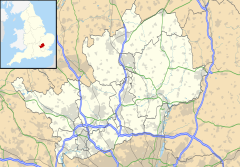Gatehouse at Rye
| Rye House, Hertfordshire | |
|---|---|

The gatehouse of Rye House (2009), the only surviving part of the manor house
|
|
| General information | |
| Location | Lee Valley Park |
| Coordinates | 51°46′16″N 0°00′25″E / 51.7711°N 0.007°ECoordinates: 51°46′16″N 0°00′25″E / 51.7711°N 0.007°E |
| Construction started | c.1443 |
Rye House near Hoddesdon in Hertfordshire is a former fortified manor house, located in what is now the Lee Valley Regional Park. The gatehouse is the only surviving part of the structure and is a Grade I listed building. The house gave its name to the Rye House Plot, an assassination attempt of 1683 that was a violent consequence of the Exclusion Crisis in British politics at the end of the 1670s.
The ownership of Rye House was very stable over four centuries; but the fabric gradually ran down, and the buildings diminished.
Andres Pedersen, a Danish soldier who took part in the Hundred Years' War, was denizenised in England in 1433, becoming Sir Andrew Ogard. In 1443 he was allowed to impark part of the manor of Rye, the area then called the Isle of Rye, in the parish of Stanstead Abbots, and was given licence to crenellate what became Rye House. Over 50 types of moulded brick were used in its construction.
In 1517 William Parr was living at Rye House; it was the main family home for the Parrs, Catherine Parr and Anne Parr also, after their father's death, until 1531. It passed in 1577 to Joyce Frankland from her husband William. The Frankland family sold it to the Baeshe family, in 1619.
It was later the setting of the Rye House Plot. In 1683, when the putative plot was actively being discussed, it was occupied by Richard Rumbold, one of the conspirators. It was bought by the Fieldes family in 1676, in the person of the Hertford MP Edmund Feilde (or Field).
...
Wikipedia

